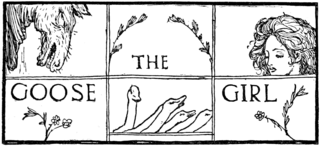Summary | Excerpt | Reviews | Beyond the Book | Read-Alikes | Genres & Themes | Author Bio

This article relates to A Sorceress Comes to Call
 "The Goose Girl" tells the story of a princess who is sent by her mother to a faraway land to marry. The queen gives her daughter a magical talking horse and talisman, telling her to care for both, as they will protect her from harm. But when the princess loses the talisman, the waiting maid she is traveling with forces her to change places and, when they arrive at the prince's castle, convinces everyone that she is the princess. Fearing that the horse will reveal her treachery, the waiting maid has him decapitated and his severed head laments over the princess's fate as she is forced to spend her days minding the king's geese. After some intervention from the king, and a particularly grisly end for the waiting maid, the true bride is married to her prince.
"The Goose Girl" tells the story of a princess who is sent by her mother to a faraway land to marry. The queen gives her daughter a magical talking horse and talisman, telling her to care for both, as they will protect her from harm. But when the princess loses the talisman, the waiting maid she is traveling with forces her to change places and, when they arrive at the prince's castle, convinces everyone that she is the princess. Fearing that the horse will reveal her treachery, the waiting maid has him decapitated and his severed head laments over the princess's fate as she is forced to spend her days minding the king's geese. After some intervention from the king, and a particularly grisly end for the waiting maid, the true bride is married to her prince.
Jacob and Wilhelm Grimm heard this story, one of more than forty, in 1813 from Dorothea Viehmann, who lived in the German town of Hesse. They included a dedication to her in their second edition of stories, in which they described her as poor, perhaps somewhat bizarrely believing that if they presented her as an uneducated woman from a humble background the stories would sell better or carry more validity. Dorothea was in truth an innkeeper's daughter who spoke French in addition to German and had heard many stories over the years from her father's guests. She had been single-handedly raising seven children by selling produce from her garden at the local market when the Grimms met her. Despite this attempt at altering her identity, they were clearly grateful for Dorothea's contributions, accompanying their dedication with a beautiful frontispiece portrait created by their brother Ludwig.
Interestingly, identity is a major theme that runs through the story, and through Kingfisher's adaptation A Sorceress Comes to Call. In Kingfisher's novel, Cordelia is a character without any identity. She exists entirely to do her mother Evangeline's bidding and is considered little more than an extension of her. When Cordelia attempts to assert any kind of autonomy, her mother places her under "obedience," a horrifying spell that gives Evangeline total control over her body, down to the tiniest wiggle of a finger.
In "The Goose Girl," when the princess loses her mother's talisman, a handkerchief with three drops of her blood, she loses a deeply personal gift. The handkerchief is symbolic of the princess taking a part of her mother with her but also represents the protective bond of blood between mother and child. Without it, she finds herself completely under the control of the waiting maid, who takes the opportunity to elevate her status and forces the princess to not only change places with her but to swear never to tell anyone who she is, effectively taking over her identity.
In Kingfisher's story, Evangeline appears as an amalgam of the waiting maid character and the queen. Magical control takes the place of the oath the waiting maid makes the princess swear but maternal ties are an equally strong influence on Cordelia, who continually struggles with the instinctive love she has for her mother. She longs for Evangeline's affection even though she knows what her mother is capable of.
The original story and Kingfisher's adaptation both also touch on themes of women being forced to hide their ambitions or talents, either from threat of persecution or because it will upset the status quo. In the Grimm tale, the princess shows signs of magical ability herself; she's able to speak with her horse Falada (even after he is beheaded) and she casts a spell to make the wind take the hat of a boy who annoys her. She can't let anyone know she's doing these things because it will break her promise to the waiting maid.
In this version, a truly diabolical punishment is delivered to the waiting maid. While the original tale seems to be offering a harsh commentary on the power dynamics among the classes, with a clear message that servants should remember their place, Kingfisher leaves her readers with a sense of melancholy over Evangeline's experiences. Her methods are cruel and murderous, but it is hard not to have at least a modicum of empathy for a woman using what power she has to build a better life for herself and her child.
Picture for "The Goose Girl" from Grimm's Household Tales, 1912, illustrated by R. Anning Bell
Courtesy of New York Public Library, via Wikimedia Commons
Filed under Books and Authors
![]() This article relates to A Sorceress Comes to Call.
It first ran in the August 21, 2024
issue of BookBrowse Recommends.
This article relates to A Sorceress Comes to Call.
It first ran in the August 21, 2024
issue of BookBrowse Recommends.
Your guide toexceptional books
BookBrowse seeks out and recommends the best in contemporary fiction and nonfiction—books that not only engage and entertain but also deepen our understanding of ourselves and the world around us.